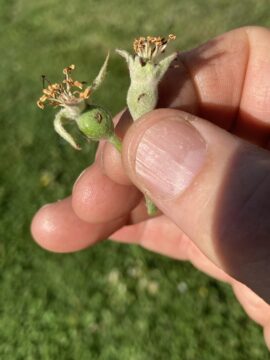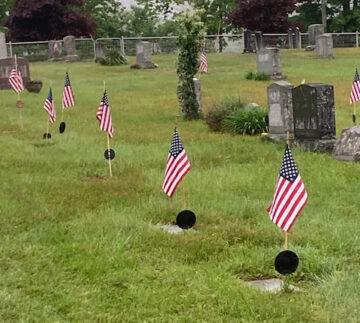by Mike Bendzela

The week before Memorial Day, I’m back to my old tricks again, poisoning pests in my little orchard. It’s the period after petal fall, when the romance of bloom season gives way to the horrors of war. Commencing in mid-May in Maine, I walk among fruit trees amidst a profusion of blossoms; but by the end of the month, I lie awake at night worrying over a contingent of apple pests — I know I’m going to be busy for a few weeks. I’ve written previously about the trials of raising a species (Malus sieversii) originally from Kazakhstan in the ghastly climate of northern New England. The pests of the northeast — natives such as plum curculio and flatheaded appletree borer, and introduced invaders such as European sawfly and codling moth — have brilliantly adapted themselves to our New World orchards. You have to admire the intrepid little buggers for fulfilling their Darwinian duties so efficiently.
One cannot reach a truce with creatures whose brains are smaller than the tip of a pen. Plant a buffet of fruits that insects like — apples, pears, plums, and peaches — and don’t be surprised if they show up for the feast — in droves. And so, I must strap on a backpack sprayer, or hook a thirty-gallon tank to the back of my riding mower, and start killing. If I want table-quality heritage apples to sell to local markets, I have to resign myself to the equivalent of waging a napalm campaign against my arthropod companions. Does farming have to be like this, even on such a small scale? Must we slaughter our competitors? This question bugs me to no end.
During the early years of our orcharding adventure, my partner and I were possessed by the delusion of growing “natural, organic” apples. Consequently, we suffered defoliated trees, blighted fruits, and trunks riddled like Swiss cheese with borer tunnels. And yet apples (and peaches, plums, and pears) are by definition natural and organic — that is, evolved, carbon-based life forms. But in the context of modern dietary and farming trends, these terms have taken on connotations of authenticity and superior virtue. We didn’t exactly think that having a kind, empathetic attitude toward Mother Nature would preserve our trees from predators, but we came pretty close. We let the grass grow “to preserve beneficial insects”; we eschewed “toxins” that wiped out arthropods indiscriminately; we sprayed the trees with clay hoping to discourage the pests from dining on our fruit, believing they would seek sustenance elsewhere. In the fall, we were always shocked by the results. How could Nature do this to us when we obviously cared?
Now, like the large, commercial growers, we are dependent on the petrochemicals industry, and I am doomed to walk the orchard wearing a face shield and nitrile gloves, wielding a spray wand, every week to ten days throughout May and June. If I spray ten times during the season, I have sprayed a lot — all I can stand, in fact. The fruits show minimal damage — a little flyspeck and sooty blotch marring the skin, perhaps a healed-over insect bite or two. The apples are marketable and have even won me blue ribbons at a local agricultural fair.
It’s still unsettling to think of the millions of organisms I slaughter every year just to make a little pocket money over the summer. Just imagine what goes into the panoply of comestibles that adorn supermarkets every day, in every location, for everyone’s taking. If modern agriculture is so hard, think how it must have been for our ancestors, before the onset of equipment, chemicals, and diesel engines. It’s a wonder our species didn’t die out during the Neolithic revolution, driven to extinction by locust plagues.
In a dreadful irony, at the end of May I literally walk across the street after exterminating pests in the orchard and begin setting out flags for veterans in the local cemetery, where I have a summer job. It’s a reminder of how silly it is to judge farmers for having to kill pests to make a living. All those flags waving in the spring breeze signal that we humans have been busy trying to exterminate each other since our history as a species began.
Those who have seen the film Apocalypse, Now may recall the remarkable scene featuring a character called The Roach. A desperate machine gunner is shooting helplessly at someone “out on the wire” taunting the American troops. They all can hear a Vietnam-accented voice out in the darkness: “F— you, GI! . . . I kill you!” Failing to snuff out the voice, the machine gunner slaps around a comrade and tells him, “Go get The Roach!” The soldier who has been summoned — clearly stoned out of his mind — rises from his niche amidst sandbags carrying a grenade launcher. He turns downs a radio blaring rock music, listens quietly to the distant taunts, takes aim, shoots . . . With a bang, all taunting stops. The Roach stares into space and delivers a final expletive. Prey has successfully become predator.
Even though I am nearing retirement age, I have led a sheltered and pacific life. I have no military service. My father and one of my nephews have served in the Navy but never fought in any wars. I have an uncle who was in Vietnam but never talked about it. (He died in 2004.) That’s the extent of war in my life. I’ve never physically harmed another human being . . . except for one grade school altercation, when I challenged a boy to a fight after he accused me of liking a girl we called Snooky. When word got out that Beagle (my last name mangled) had challenged Napper Gas (he smelled like pee) to a fist fight, the result was widespread mirth. It was as if Linus had challenged Pig Pen to a fight. I managed to land a punch on his nose, but it didn’t bleed. I felt stupid afterward. Nothing was gained, nothing proven.
All wars seem to be practiced for Reasons that are merely versions of the sentiment, We have to chinga them before they chinga us. A high school friend brought this saying back home with him after he was discharged from a military base in Texas. Are we really such brutes? With mere memory as guide, I can list place names, in roughly chronological order, where unthinkable horrors have happened: Chickamauga, Wounded Knee, Gallipoli, Sobibor, My Lai, Falluja, Bucha, Gaza . . . It’s easy for me to glibly type such words when on some level my brain refuses to believe these events actually occurred. Our vaunted language always fails us. “There were many words that you could not stand to hear,” Hemingway wrote, “and finally only the names of places had dignity.”
The Hebrew Bible doesn’t actually say Yahweh Elohim grew “apples” for the first humans, but given the death that has ensued after the first bite of the forbidden fruit, He might as well have.

_____________
Images
Photographs by the author.
